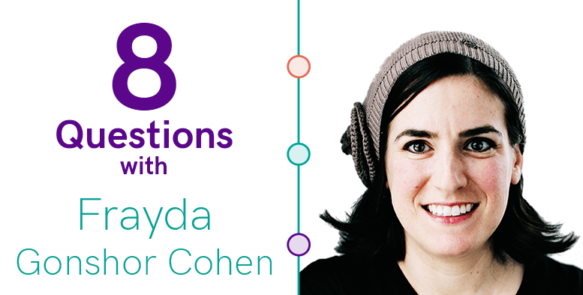
8 Questions with Frayda Gonshor Cohen
In “8 Questions With…,” we share a brief Q&A with a staff member. In this edition, we hear from Frayda Gonshor Cohen, EdD, Senior Project Leader, who joined the Rosov Consulting (RC) team in 2011 and brings expertise in educational research and a breadth of experience in a variety of Jewish educational contexts.
1. What’s your area(s) of expertise and how has it been beneficial and led to success in your work?
I hold a doctorate in educational leadership from Mills College. In my dissertation I studied the moral dilemmas of teaching in the Jewish day school context. I think both the content of my dissertation and the methodologies I studied continue to inform my work. In terms of content, we can think about a dilemma as a moment when a person finds themselves caught between two (or more!) competing values. Being able to recognize multiple values at play in any given situation is an important part of what we do when we support our clients — understanding their program/organization and what makes it tick requires a sensitivity to the larger values that underpin their decision making. In terms of methodology, as a qualitative researcher I love the process of listening deeply and trying to understand a situation from multiple perspectives. I also adore the process of seeing data points come together to tell a story that helps our partners see things in a new light.
Also, I’m a teacher at heart. Though I’ve left the classroom, the moments I love the most in my work at RC are translating our findings into meaning-making opportunities for our clients.
2. What experiences have led you into your current career path?
I am sure that my years as a participant and then educator in a variety of Jewish educational contexts secured my commitment to the Jewish community. Ultimately, I think the most critical experience that led me to where I am at RC was participating in the Wexner Graduate/Davidson Scholar Fellowship. The Fellowship not only supported my graduate work but led me directly to Wendy’s door. I remember distinctly when Cindy Chazan, then VP of the Foundation (and a “connector” par excellence), suggested I should meet with Wendy Rosov who was just starting her consulting business. Wendy agreed to an informational interview and to help me out with a paper presentation for The Network for Research in Jewish Education — the rest is history.
3. What do you like learning about most through your work?
I love learning about the tremendous creativity in the Jewish educational and philanthropic space. One of the things that helps me learn a lot about an organization is working with them to develop their Theories of Change.
4. What do you like most about working at Rosov Consulting?
I’ve been lucky enough to be with Rosov Consulting for over eight years. I cherish the opportunity to work with a diverse group of colleagues, and especially to be mentored by the senior team for whom I have tremendous respect. I am regularly energized by the great privilege I have to work closely with our clients whose organizations (grantmaking or grantee) are doing so much good in our community.
5. What are some challenges of your work?
One challenge of our work is that by necessity, we are limited to addressing the questions and concerns that are defined by our scopes of work. When we design projects, we carefully think about our targeted learning questions/goals and design work plans accordingly. It’s only natural that once we dig into things, more questions come to the surface and we want to explore them. Still, in order to do our work well, and deliver on what we’ve designed, we generally need to stay focused on the questions we set out to explore at the outset.
6. What have been the biggest changes in the field and/or your work specifically since you started?
I think it is quite clear the field of Jewish philanthropy is becoming more and more data savvy, and this makes our work ever more exciting. There are so many questions that funders and program providers want to know more about, and online survey tools make it relatively easy to ask those questions directly to the people you want to hear from. That said, just because it’s possible to ask the question, it doesn’t necessarily mean we should.
7. How do you think your job and/or the field might change in the next 10 years?
With a major transfer of wealth predicted over the coming years, new philanthropies and new priorities are on the horizon. Understanding the needs, concerns, and goals of the incoming generation of philanthropists will be important in helping inform their strategies.
8. What do you think is essential reading to excel in your field?
I think the book Getting to Maybe: How The World Is Changed is a great primer on how complex social change is, and how important it is for evaluation efforts to be flexible enough to accommodate the messiness.




